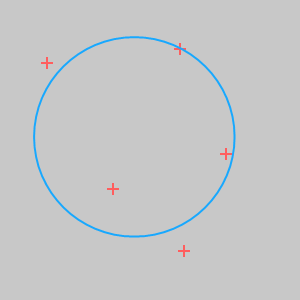Back to Aurora Vision Library website

You are here: Start » Function Reference » Geometry 2D » Geometry 2D Fitting » FitCircleToPoints
FitCircleToPoints
| Header: | AVL.h |
|---|---|
| Namespace: | avl |
| Module: | FoundationBasic |
Approximates points with a circle using selected outliers suppression method.
Syntax
C++
C#
void avl::FitCircleToPoints ( const atl::Array<avl::Point2D>& inPoints, atl::Optional<const avl::Range&> inRange, avl::CircleFittingMethod::Type inFittingMethod, atl::Optional<avl::MEstimator::Type> inOutlierSuppression, atl::Conditional<avl::Circle2D>& outCircle, atl::Optional<atl::Array<avl::Point2D>&> outInliers = atl::NIL )
Parameters
| Name | Type | Default | Description | |
|---|---|---|---|---|
 |
inPoints | const Array<Point2D>& | ||
 |
inRange | Optional<const Range&> | NIL | Determines which array points take part in fitting process |
 |
inFittingMethod | CircleFittingMethod::Type | ||
 |
inOutlierSuppression | Optional<MEstimator::Type> | NIL | |
 |
outCircle | Conditional<Circle2D>& | Fitted circle or nothing if method failed to converge | |
 |
outInliers | Optional<Array<Point2D>&> | NIL | Points matching the computed circle |
Optional Outputs
The computation of following outputs can be switched off by passing value atl::NIL to these parameters: outInliers.
Read more about Optional Outputs.
Description
The operation computes a circle which approximates the input points best. Several methods are available, AlgebraicKasa being the fastest one. It is also the most inaccurate when the input points are sampled along small arc only.
Examples
 |
The resulting outCircle drawn with the input points, inFittingMethod = AlgebraicKasa and inOutlierSuppression = Auto.
Errors
List of possible exceptions:
| Error type | Description |
|---|---|
| DomainError | Outlier suppression is supported only in algebraic fitting methods. |
| DomainError | Range exceeds the input point array in FitCircleToPoints. |
See Also
- FitArcToPoints – Approximates points with an arc using the selected outliers suppression method.
- FitLineToPoints – Approximates points with a line using the Least Squares method.

